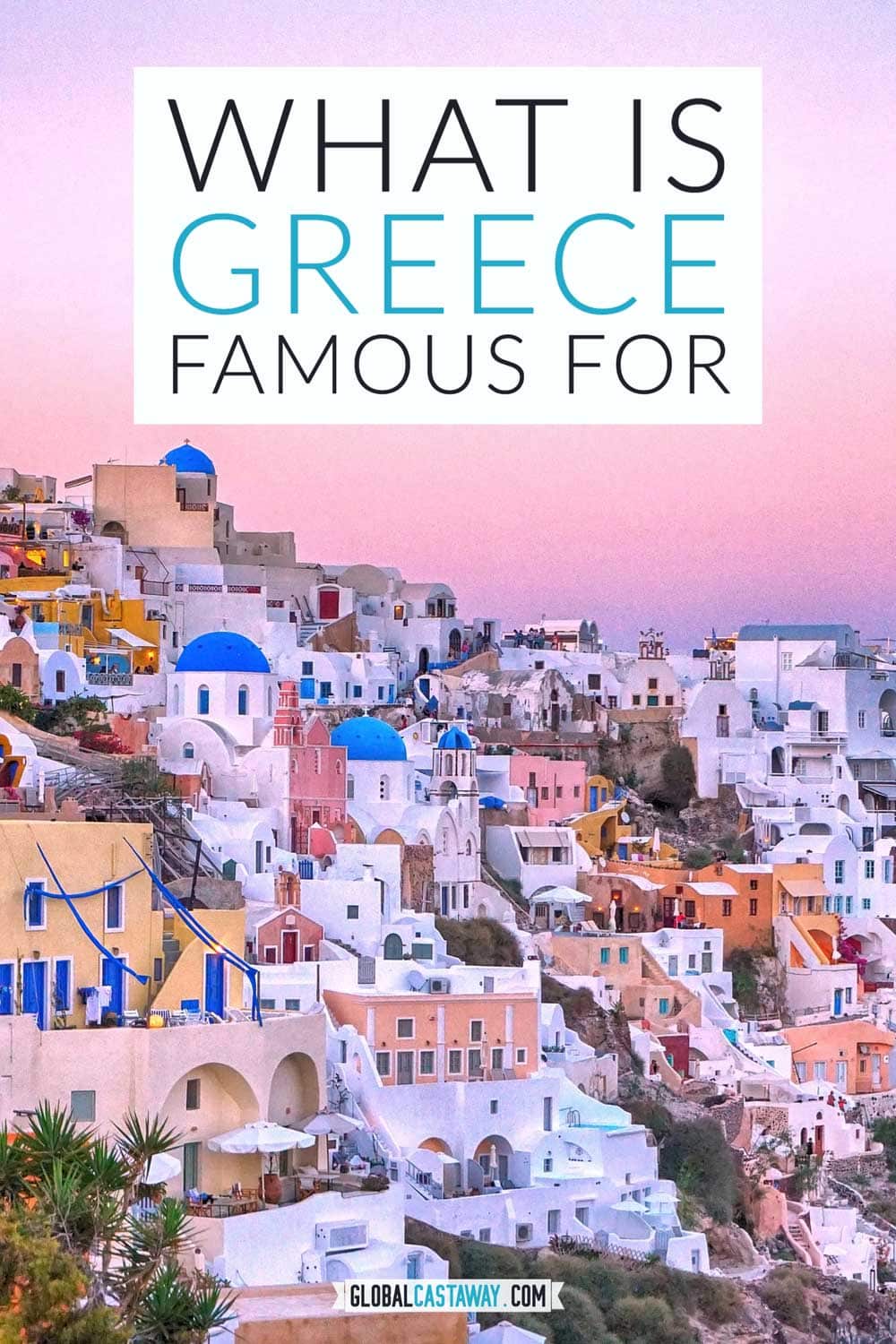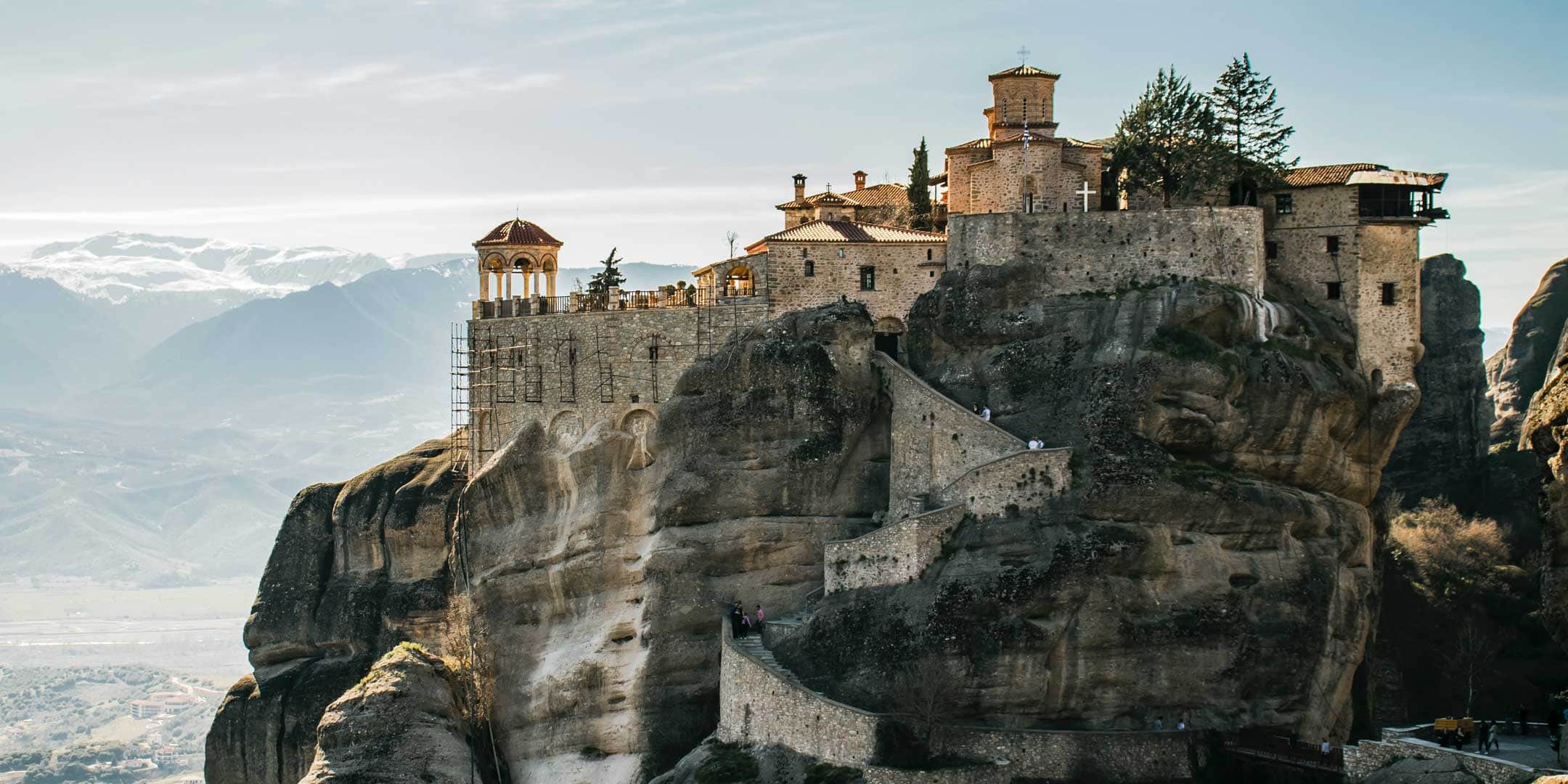There’s no better place to spend your summer than a shiny, a little bit antiqued Greek island. Before you embark on the trip, though, you better get prepared. Not that you won’t have a great time anyway, it may just come in handy knowing what Greece is famous for before getting there.
The 15 answers I’m about to give you are all great conversation-starters and will help you break the ice with that cute greek girl/boy you just saw on the beach. What is that? You’re on a family vacation?
Well, in that case, you’re about to get a few extra tools to bore your kids and teach them something about this jewel of a country.
From ancient Greek inventions that shaped the modern world to rock pillar monasteries, prepare for a case of severe wanderlust because you’re about to find out exactly what is Greece known for.
The Acropolis and More
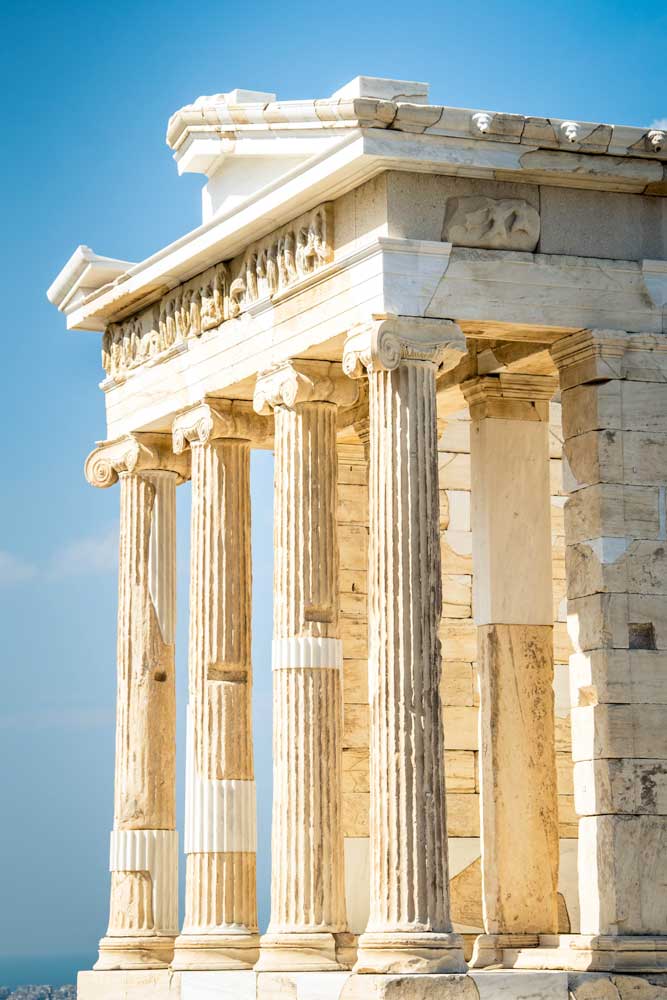
The most prominent landmark in Greece and a symbol of the western world, the Acropolis, is a group of ancient buildings overlooking the capital of Athens.
Constructed mainly in the 5th century BC during the Golden Age of Pericles era, the most famous structures in the Acropolis are the Parthenon (used as a face of the Acropolis all around the world), the Old Temple of Athena, and the Temple of Athena Nike. To make the experience complete, you also need to check out the nearby new Acropolis Museum, where the most prominent artifacts of the ancient sight are on display.
While the Acropolis is world-renounced, Greece is famous for having an abundance of archeological sites (a big chunk of them – UNESCO recognized). You have the Sanctuary of Delphi, the palace of Minoan King Minos – Knossos, the Temple of Poseidon in Sounion, and plenty others. There are so many ancient artifacts found in Greece that it’s no wonder the country is number one for archeological museums globally, housing over 100 of them.
Countless Islands

When you ask most people what is Greece famous for, the most common answer would be – islands. And that’s quite true since Greece owns over 6,000 islands, 227 of them inhabited. The Greek shoreline equals 16,000 km (9941 mi), making no point of the country more than 137 km (85 mi) farthest from the sea.
The only problem with the Greek islands is that you have so many options that you may get overwhelmed. The most popular choices are:
- Naxos – best beaches in the country combined with many hiking trails.
- Mykonos – vibrant nightlife, trendy restaurants, picturesque setting.
- Santorini – top luxurious villas, breathtaking landscape, the most photogenic island there is.
- Crete – a little bit of everything, cute little towns, many picturesque spots, archeological wonders.
- Rhodes – medieval setting full of castles.
- Zakynthos – fairytale beach with a shipwreck (Navagio) and plenty of sea turtles.
- Corfu – traditional cuisine influenced by 400 years of Venetian occupation.
Astonishing Beaches

And since no island is complete without top-notch beaches, the next thing Greece is known for is astonishing beaches. And boy, oh boy, does Greece has an abundance of that!
No matter what island you choose, you are going to find some shoreline magic. I kid you not; even the tiny, unmarked beaches are world-class there!
If you prefer something more extraordinary, you can check the country’s multicolored beaches. The island of Crete has two breathtaking pink beaches – Balos and Elafonissi, while Santorini is home to a black sand beach (Perissa) and a red sand one (Kokkini Paralia). My favorite is the tiny white Skinaria Beach in southern Crete.
See Also: What is Portugal Famous For?
Greek Olives and Olive Oil

I was really trying to enlist only exciting things here, but there’s nothing I can do for this one. Olives and olive oil may not be that exciting, but they’re definitely something Greece is famous for all around the world.
Being among the largest producers globally, the Greeks seem to be obsessed with olives. There are olive museums, olive tastings, olive tours, t-shirts with olives, and of course, olive trees everywhere. When speaking to the locals, don’t ever mention olives from other countries. God forbid saying you liked them better than the Greek ones! Such blasphemy may get you thrown out of a restaurant.
The legend says that back in time, the Olympian Gods Athena and Poseidon competed about who should be the capital city’s patron. Poseidon offers the sea to the local people, while Athena gave them the first olive tree. Can you guess who won ( hint: the name today is Athens, not Poseidonis)? That’s how much the Greeks love olives.
Greek Cuisine

If you ask a foodie what is Greece known for, the answer would be instant – Greek food. Greek cuisine has been refined for centuries to become what it is today – one of the most healthy and popular menus on the planet.
I’m neither a cook nor a foodie, so I won’t be able to get into detail here, but those are my favorite Greek dishes:
- Souvlaki and gyro – souvlaki is charcoal-grilled meat (usually lamb or pork) on a skewer. Put souvlaki in a greek flatbread with some local sauces and vegetables, and you get a gyro – the Greek version of the doner kebap.
- Moussaka – layers of sautéed aubergine, minced lamb, fried puréed tomato, onion, garlic, and spices like cinnamon and allspice combined with potatoes and a cheese sauce. Very popular dish all around the Balkans.
- Dips – tzatziki (yogurt, cucumber, and garlic), melitzanosalata (aubergine), fava (creamy split pea purée), tirokafteri (cheese dip with chilies). They are all amazing.
Other popular greek foods are Feta Cheese, Greek Salad, all sorts of seafood (especially octopus), olives (of course), and baklava. The local spirit drink (ouzo) and coffee version (Greek coffee) are also well known worldwide.
Myths and Magic
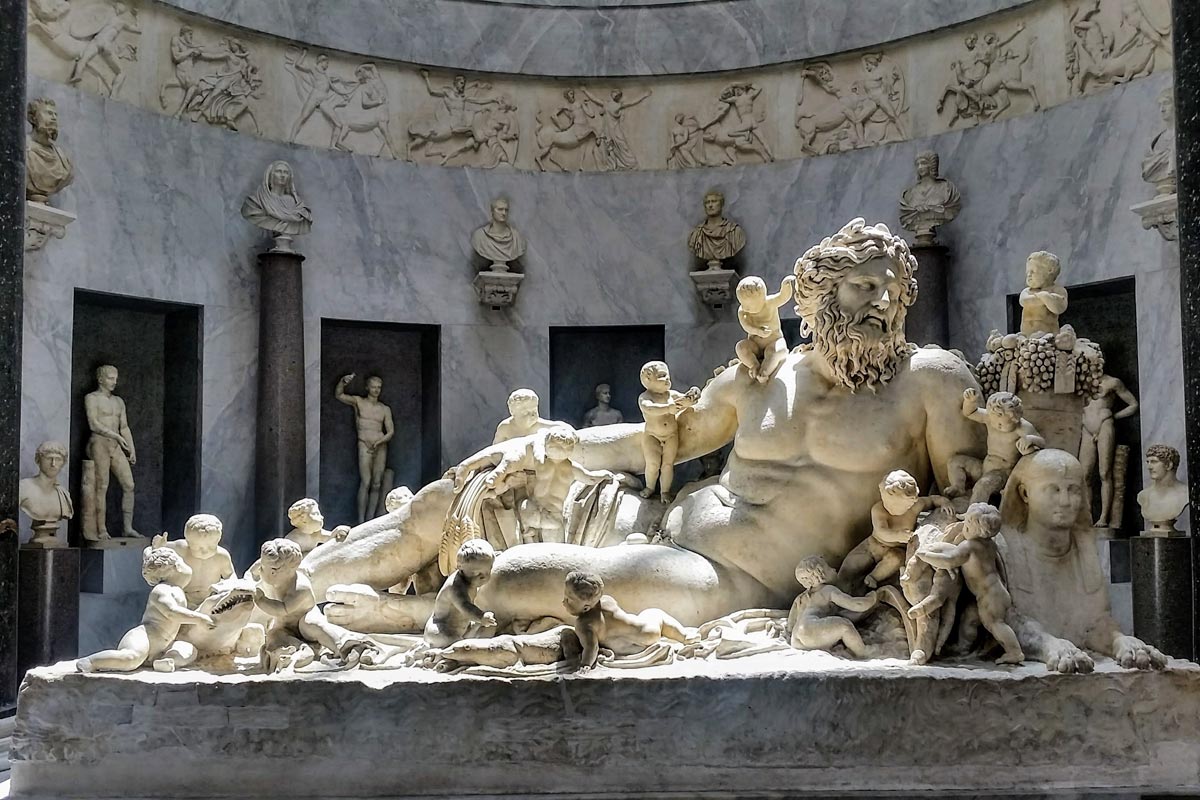
If you ask the 4-year-old me what is Greece famous for, the answer would be Gods and heroes. I just loved the ancient Greek myths and legends. From the Trojan war to Mount Olympus, from the Iliad to the Odyssey, long before I found out about Batman and Captain America, I had my mythical hero idols in Hercules and Odysseus.
And it’s not just me. From the times of the Roman Republic (and later empire) to the mainstream culture today, the world has embraced the ancient Greek Gods and myths, and there’s barely anyone who doesn’t know who Zeus is or what’s a Trojan Horse.
From Disney’s Hercules to Brad Pit’s Achilles and Gerald Butler’s Leonidas (this is SPARTAAA), the ancient Greek myths may be thousands of years old, but they still find a way to entertain us today.
See Also: What is Morocco Famous For?
Birthplace of Democracy

Ancient Greeks discovered quite a lot of stuff, but probably their most significant contribution to society was democracy.
To be fair, not all of them endorsed this insane for the time way of governance. Ancient Greece was divided into a thousand city-states named poleis. The ones who came up with and embraced democracy were the Athenians circa 508 BC. They did have some conditions about who was allowed to vote, though. Only adult male Athenians, who had completed their military training as ephebes, had the sacred right.
The ancient democracy lasted for about two centuries before it was undermined by Plato’s and his student Aristotle’s works, where they praised Sparta’s political stability (that had nothing to do with democracy).
Cradle of Philosophy

Speaking of Plato and Aristotle, we can’s miss mentioning ancient Greek philosophy. Apparently, the people in Athens had established their lives so well that they started thinking more in-depth about everything that surrounds them. That’s how philosophy was born.
Thales, an astronomer and a mathematician was considered by Aristotle to be the first philosopher of the Greek tradition. He was followed by Pythagoras, Plato, Socrates, Democritus Anaxagoras, and many other bright minds who eventually began to separate philosophy and science from theology. Something that was truly on the next level for the 6th century BC.
Champions of Mathematics
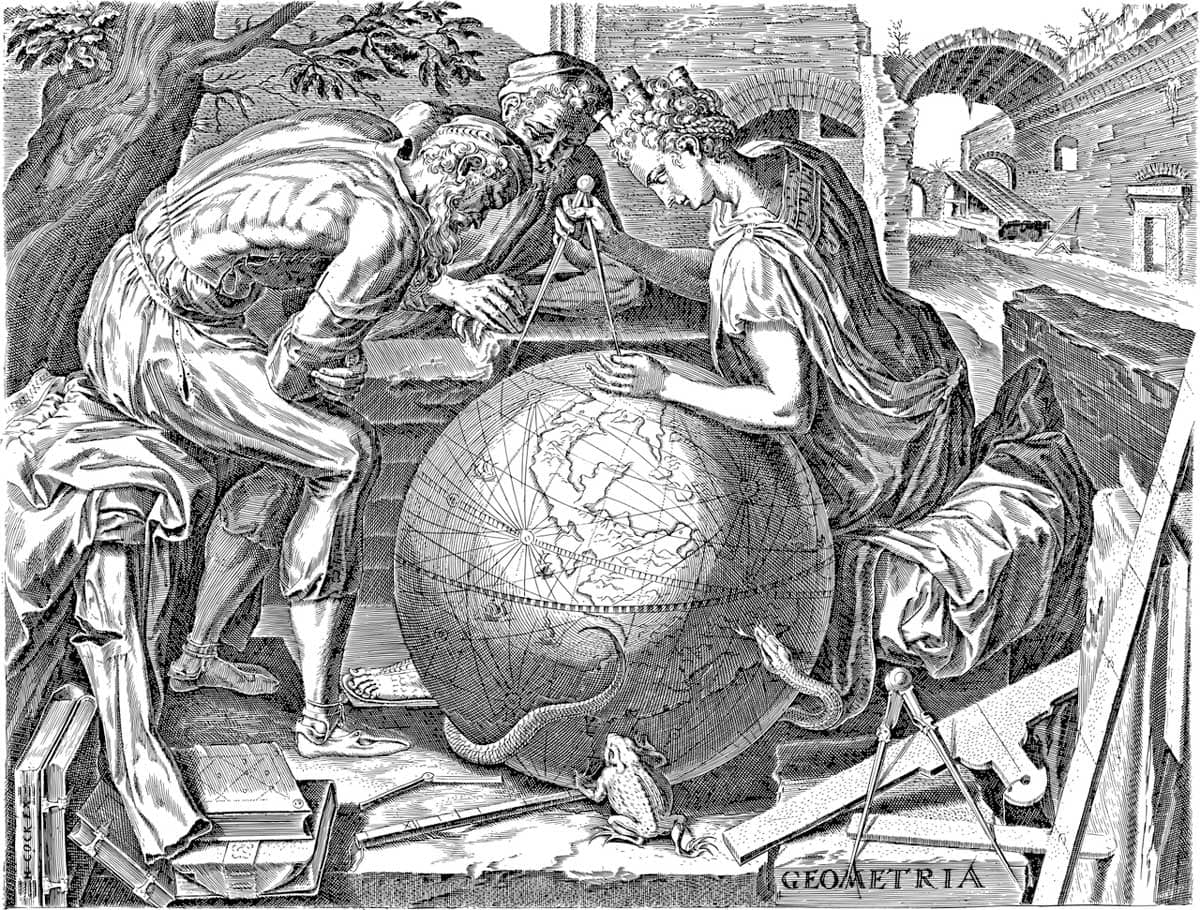
Mathematics is yet another science the ancient Greeks discovered. Now, when I’m saying mathematics, I don’t mean basic counting. Humankind had realized long ago that if you add one apple to another, you’re gonna get two apples. Ancient Babylonians and Egyptians used basic arithmetic and algebra for taxation purposes as far as 3000 BC.
What the ancient Greeks did was to start a systematic study of mathematics as a subject in its own right. They did it so well that the Pythagorean theorem became the most widespread mathematical development (after basic calculation) in the ancient world.
The mathematics foundations set by Euclid, Archimedes, Pythagoras, and Aristotle, among others, were crucial to the development of humankind and the modern world we know today.
See Also: What is Spain Famous For?
Olympic Games
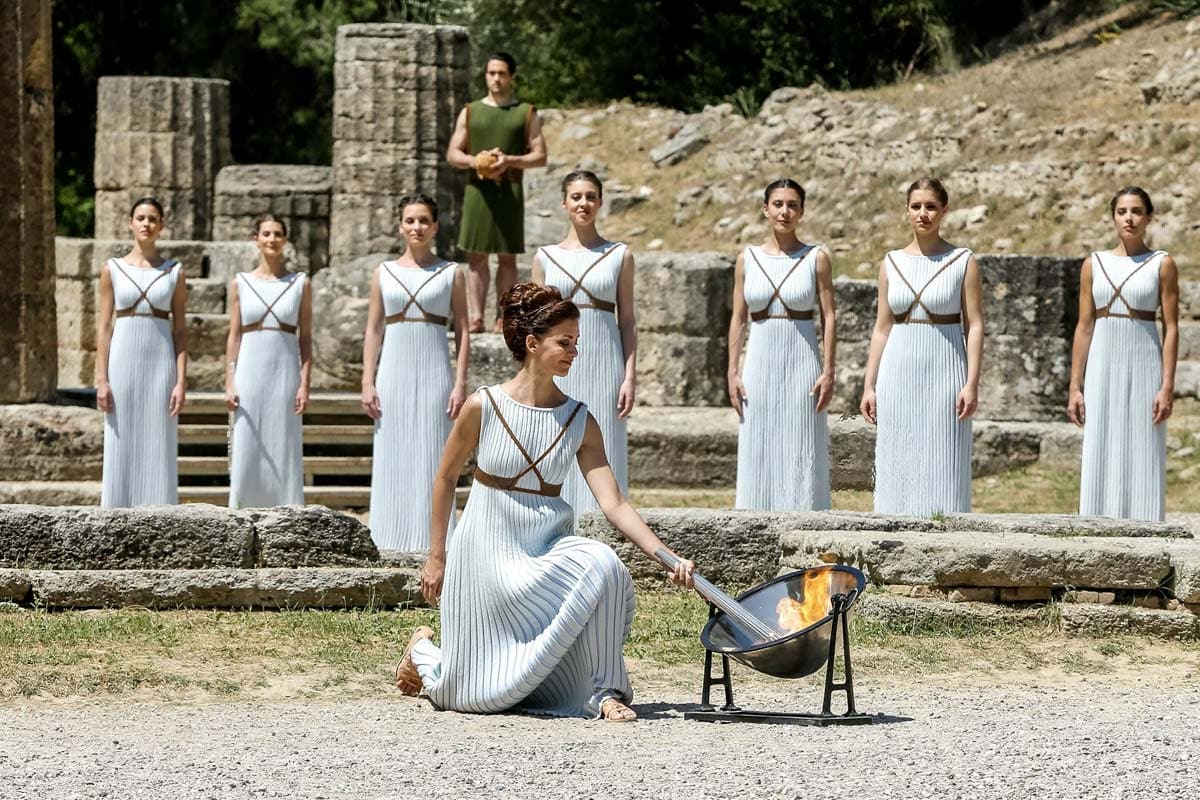
The ancient Greeks were not just incredibly smart; they were also quite athletic. The best proof is that 2,500 years later, their top sporting festival – the Olympic Games- is still the world’s number one sporting event.
The first Olympic Games were held in 776 BC at the ancient site of Olympia. At the time, there was only one event, a 192-meter (630 ft) footrace, which was won by a cook named Coroebus.
The tradition to have Olympic Games every four years lasted all the way to 393 AD when the Roman emperor Theodosius I banned them for some reason (probably the Romans performed miserably). The tradition was restarted in the late 19th century and established the Olympics once again as the biggest sports event on the planet.
Founders of Western Medicine

Have you heard of the Hippocratic Oath? The oath where doctors swear to treat the sick to the best of one’s ability, preserve patient privacy, teach the secrets of medicine to the next generation, and so on. It was written in antiquity and is one of the oldest binding documents there are. And yes, Hippocrates was Greek.
All medics swear by this ancient doctor’s document because modern medicine is yet another thing Greece is famous for. Known as the father of medicine, Hippocrates founded the Hippocratic School of Medicine circa 400 BC and set the foundations of the one science that helped humankind the most.
Theatre
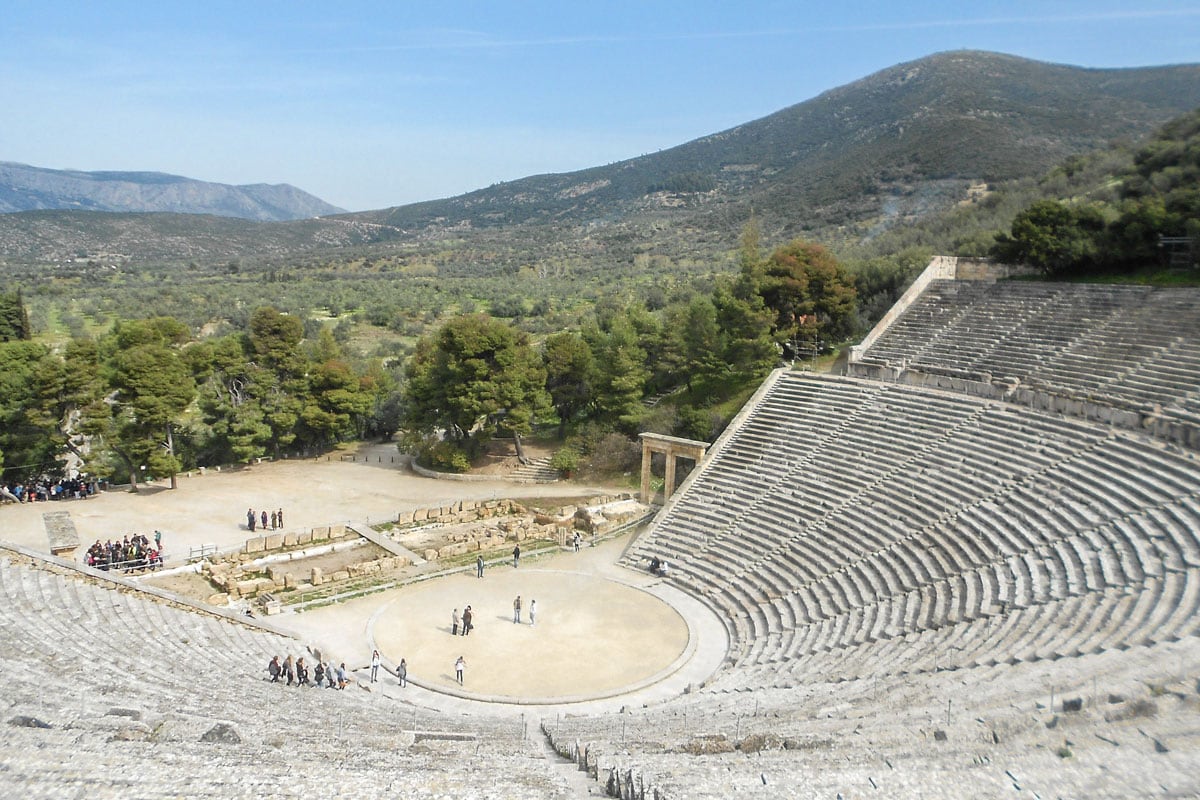
Pretty sure I won’t surprise anyone when I tell you the ancient Greeks invented theatre and a lot of its genres (comedy, tragedy, and satire being the most prominent ones).
The first theatre shows were actually ritual activities that later evolved into the spectacular art we know today. Even the word theatre came from ancient Greece. Back in the times, it had a broader meaning, including performance in festivals, religious rituals, law, athletics, music, poetry, weddings, and funerals.
Believe it or not, today Athens is still the most theatrical city globally, housing an impressive amount of 148 theaters.
Peculiar Monasteries

There are thousands of beautiful Orthodox churches and monasteries in the country. The ones that Greece is known for, however, are a bit bizarre. I’m talking about Meteora monasteries and the Mount Athos ones.
The Meteora temples are unique one-of-a-kind attraction you can’t see anywhere else. They are perched on the tops of natural rock pillars (some of them 300 m/ 985 ft high) and create an otherworldly landscape, as picture-perfect as possible.
The Mount Athos monasteries are not as picturesque as the Meteora ones but are way more mystical. Being under the direct jurisdiction of the Ecumenical Patriarch of Constantinople, those holy temples have their own rules and strictly forbid the entrance of women. Not only in the monasteries but in the entire area. Even if you’re a man, exploring those mystical churches is not an easy task. You need to request a special permission and wait around six months before you’re allowed a visit.
Alpha and Omega

Here’s a surprise, the ancient Greeks did NOT invent the alphabet. You didn’t expect that, did you? That honor belongs to the Phoenicians.
What the ancient Greeks did was perfecting their alphabet so much that the Greeks today still use it…like 3000 years later!
The Greek alphabet is so old that even the word alphabet derives from it( alpha and beta are the first two Greek letters). Plenty of greek letters have found their way into our modern lives (even outside Greece). Things like the Omega symbol meaning the end or Gama rays turning doctor Banner into the Incredible Hulk are only a few examples.
Passionate Souls and Vibrant Nightlife

For most people who have already been there, the answer to what is Greece famous for is only one – the passionate souls of the people there. Yes, the beaches are fantastic, the food is great, and they have tons of history, pretty much inventing everything, but the memories that last forever are the ones of the people there.
The Greek people are very passionate souls that love to party every time they can. They celebrate their name days like birthdays; they throw plates around when they are happy; they dance sirtaki with glasses full of ouzo on their heads and basically live like there’s no tomorrow. If you ever find yourself in Greece, embrace the locals’ spirit; that way, your incredible travel experience is 100% guaranteed!
That’s all from me, I hope now you know what Greece is famous for.
————————————
If you haven’t planned your trip there yet, find out how I plan my trips!
————————————
I have 18 bucket list ideas for Greece. See my impossible bucket list of 1700+ adventures!
Have you been to Greece?
Some of the above are affiliate links and I will earn a percentage of the sale if you purchase through them at no extra cost to you. This helps keep my site running – so thanks in advance for your support!


